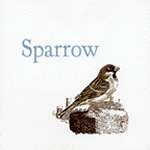|
|
 |
Dusted Reviews
Artist: Sparrow Album: Sparrow Label: Overcoat Review date: Sep. 30, 2003 |

|
|
|
 |
Jason Zumpano’s name ought to ring a few bells – he was the drummer and namesake of the Vancouver indie-pop band Zumpano, known in some circles for two mid-’90s releases on Sub Pop, Look What the Rookie Did and Goin’ Through Changes, but better known for being the first band of Carl Newman, the singer and songwriter behind the New Pornographers. Given his background as an unabashed pop revivalist – Zumpano (the band) was compared to the Zombies more often than any other act in recent memory – one would expect to hear more of the same from Sparrow, the pop-rock combo Zumpano assembled as a second incarnation of The Sparrow, the correspondingly named instrumental combo formed after Zumpano’s (yes, the band) break-up in 1997.
But Sparrow’s chamber pop owes a bigger debt to Brill Building pop than it does to the British invasion or its American garage rock imitators, materially mined so successfully on Goin’ Through Changes. There are no submerged vocals or blown speakers on Sparrow. There are not many electric guitars and keyboards, either. There are, instead, acoustic guitars, strings, and a baby grand piano that is the band’s centerpiece. Indie pop is a big tent, but this formula even falls outside of its considerable shadow. By adhering so closely to the past the band accepts a risky proposition: Sparrow could be a triumphant display of the benefits of scouring the musical archives, or it could be a hollow re-enactment. I’m afraid it’s the latter.
While he effectively revives the standards of baroque pop – the lush arrangements, the layered strings, the catchy choruses and refrains – Zumpano fails to do much with them. The album thus sounds unfortunately dated right out of the blocks: the opening song, “Mountain on Mountain”, rolls along on a five-note piano melody, but is trapped by its formulaic structure – not just verse-chorus-verse, but the verse-chorus-verse-double chorus formula that Top 40 radio has run into the ground. Which would be fine – verse-chorus-verse has worked well enough for thousands of bands up until this point – if the choruses merited such prominent placement. To take just one example, however, the chorus of “Fifth Time Lonesome” consists of a single line – “run, run, run away from me” – sung almost as an afterthought to an unmelodic line. Given that much of this material was composed for an instrumental-only band, I’m tempted to believe that the chorus was in fact added as an afterthought. The difficulty with the songwriting hints at a larger difficulty with the band; while there are far worse singers than Jason Zumpano, his voice is still decidedly tuneless (especially in comparison to former bandmate Carl Newman’s voice, which is an unfair comparison, but one that you will make nonetheless) and, given that a strong vocal presence is de rigueur in baroque pop, that’s a strike against the album.
Of course, a band does not have to renew the conventions of a previous genre, merge them with the present state of music and make them relevant once again in order to make a good album. Certainly a lot can be said simply for executing those conventions well. But Sparrow merely nods to bands like the Left Banke that purists will argue have already done this sort of thing before, and done it better, and it lacks the catchiness and sheer force of will to make fans of more low-fidelity indie pop pay any attention at all. It’s like a new cubist painting or a modern pulp novel – overshadowed by its own influences, and uninteresting to those not already devoted to the subject.
By Tom Zimpleman
|







